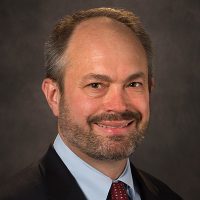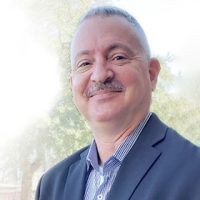Expert Panel:

Dr. William Wierda, President & CEO, CLL Global Research Foundation

Jeff Folloder, Moderator and CLL patient advocate
Our recent CLL Global Research Foundation virtual town hall featured CLL Global President, Dr. William Wierda, and Dr. Erin Parry, an Investigator of Hematologic Neoplasia at Dana-Farber Cancer Institute. CLL patient advocate Jeff Folloder moderated the event. Watch the full webinar.
Transcript
Jeff Folloder:
What are the risks of secondary cancers of CLL?
Dr. William Wierda:
So, when we talk about other cancers or second cancers, there is an increased risk for second cancers in patients with CLL. We’ve reported on that from our data set and others have. We think that it’s because the immune system doesn’t function normally. So, this surveillance and protection against developing cancers that usually occurs because of a normal immune system is deficient.
So, patients have an increased risk for other cancers developing in addition to the CLL. Those tend to be skin cancers. That’s the predominant one, non-melanoma skin cancers. We do see melanoma also in patients with CLL. Then other solid tumors can be higher risk. So, we recommend that patients are diligent about screening for other cancers.
Now we don’t recommend excessive screening, but we do recommend that patients stick to screening that they should be doing anyways and to be diligent about it. Now, skin cancer screening – so, maybe for a 50-year-old you wouldn’t recommend annual visits to the dermatologist unless they had a family history of skin cancer, etcetera. But we recommend at least a once-a-year visit with a dermatologist, but some dermatologists would like to see patients with CLL even more frequently than once a year.
But somebody should be looking at their skin at least once a year or more frequently, depending on what the dermatologist recommends. For men, PSA, annual check for prostate, and then colonoscopy every five to 10 years depending on what they see when they do the colonoscopy. For women, annual mammography and also a colonoscopy and Pap smear.
Some patients, women, will come me to in their 70s or 80s even and say, “Well, my doctor said I don’t really need a mammogram. Breast cancer’s not going to kill me. So, I’m not going to be doing it.” I’ll say, “Well, you don’t want to get breast cancer. If you do mammograms annually, there is a chance that they will pick up something. If they pick up something, it’s early detection, which is very easily eliminated and addressed and taken care of.”
“Whereas if you don’t, you’re more likely to present because you’ve found a lump, and then it’s a much more difficult and challenging problem to deal with than it would be if it was found early and could be surgically eliminated.”
Jeff Folloder:
As a patient at your facility, I see the dermatologist every year. I see the gastroenterologist on a regular basis. Literally, my only complaint is the rooms are very cold. That’s it.
Dr. William Wierda:
Absolutely.
Jeff Folloder:
So, get it done.
Dr. William Wierda:
I have a number of patients – it surprises me – who say, “Well, I’m not going to get a colonoscopy. I don’t want that.” I wonder to myself – they are at increased risk for other cancers. It is an uncomfortable procedure. It’s not comfortable.
I’ve had more than one myself, but it’s something that’s so relatively easy to do that’s preventive. They can remove polyps. They can identify cancers early. You fix the problem, as opposed to waiting until it becomes so advanced that you may need to have part of your colon removed or have a colostomy placed.
It just is so common sense to me to do that screening, and it surprises me sometimes how opposed some people are to doing it. It’s not just CLL patients. I think it’s in general. We come across people who say, “Nope, I’m not going to do it. It’s an uncomfortable procedure, and I’m not going to do it.”

